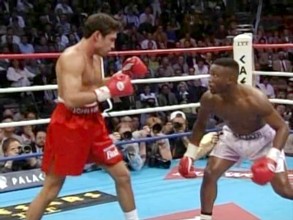 02.09.09 – G.I. Lewis – Most human endeavours illustrate the aphorism “the truth is where you find it.” Success at least partly defines, and most certainly financially rewards, popularity. This is never more true than in sports, and in boxing Pernell Whitaker demonstrated that exceptional talent is not enough to win fans, fame or fortune.
02.09.09 – G.I. Lewis – Most human endeavours illustrate the aphorism “the truth is where you find it.” Success at least partly defines, and most certainly financially rewards, popularity. This is never more true than in sports, and in boxing Pernell Whitaker demonstrated that exceptional talent is not enough to win fans, fame or fortune.
A casual fan can no longer casually turn on the television or wireless and witness a top level boxing match. The fiscal power of advertisers and marketing forces has dictated that we must pay to watch the greats of the sport ply their trade. And so they must be marketable. A plethora of world titles representing every letter of the alphabet supports an echelon of boxers and underpins a tenuous link between perceived and actual worth..
Talent doesn’t come in to it as much as a marketable background and an alluring personality that allows the public to support or vilify the athlete. Everyone loves a winner, and more specifically, everyone loves a knockout winner, especially the advertisers. This is where Pernell Whitaker comes in, or rather, doesn’t quite come in.
A precocious technical talent with slick defensive moves and a showboating style, Whitaker never found the reputation that his skill alone could have afforded him. A 1984 Olympic Gold medallist, he turned professional in Madison Square Garden in November that year. In less than eighteen months he had fought and beaten Roger Mayweather over twelve rounds.
After just fifteen professional fights he took on WBC Lightweight champion Jose Luis Ramirez who sported a record of 100 wins in 106 bouts. Whitaker lost a close and controversial split decision. Undeterred, he returned for a tuneup match before beating Greg Haugen for the IBF lightweight title in February 1989. A world champion at 25, he gained revenge over Ramirez six months later to add the WBC lightweight crown.
The following year he defeated the great Azumah Nelson over twelve rounds and a few months later became undisputed world lightweight champion with a first round knockout of Juan Nazario. In 1991 he defended the undisputed crown three times for three unanimous decision wins including closing the year over Jorge Paez.
In July 1992 he stepped up to light welterweight to defeat Rafael Pineda for the IBF title and become a champion across two weight divisions. Six months later he added the WBC title against 59-2-1 Buddy McGirt. In September 1993 he took on the great Julio Cesar Chavez, then 87-0. Whitaker showed Chavez angles all night long and outboxed the Mexican brawler only to earn a controversial draw. He could have been the first man to defeat the legend, thereby commanding the boxing world’s attention and forging his reputation in the space of a single fight, but it was not to be.
Whitaker returned home and fought there in his next two matches, including another win over Buddy McGirt. In 1995 he added the WBA light middleweight title with a win over Julio Cesar Vasquez, and defended the WBC welterweight crown over Gary Jacobs and Jake Rodriguez. The following year he earned a split decision over Wilfredo Rivera and then beat Rivera a little more convincingly.
Whitaker’s final victory would come in January 1997 when the 33 year old defeated Cuban Diosbelys Hurtado by eleventh round stoppage. In April he boxed well against rising star Oscar De La Hoya to lose a very competitive match and his WBC welterweight title. Six months later he would defeat Andrei Pestriaev only to be stripped of the victory after testing positive to cocaine.
After almost a year and a half out of boxing, Pernell returned against Felix Trinidad. In February 1999, Trinidad defended his IBF welter championship with a wide unanimous decision. Two years later Whitaker returned against Carlos Bojorquez and was in a competitive match before breaking his collarbone in the fourth and losing by TKO.
Throughout his career, Whitaker’s defensive manoeuvring would outmove, outwit, outpunch and outpoint his opponents. Unfortunately it did not capture the imagination of the boxing public. He was inducted in to the International Boxing Hall of Fame, but never in to the hearts and minds of the boxing public.